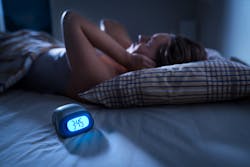Too little sleep could make vaccination less effective
How strongly a vaccine protects you may depend on getting enough sleep in the days before and after inoculation, finds a new meta-analysis examining the relationship between sleep duration and the body’s response to vaccination.
Sleeping fewer than six hours per night around the time of vaccination was associated with a robust decrease in antibody response, according to the multi-institution study published March 13 in Current Biology. Adults are typically recommended to get between seven and nine hours of sleep per night.
The meta-analysis included data on the association between sleep duration and antibody responses for the influenza and hepatitis vaccines. While comparable data on COVID-19 vaccination were not available, researchers said their study highlighted the need to identify simple behavioral interventions, such as sufficient sleep, that could improve the response to COVID-19 vaccination amid the ongoing pandemic.
The weakened antibody response in those with shortened sleep was so profound, it was similar to the decline in COVID-19 antibodies two months following vaccination with the Pfizer-BioNTech or Moderna shots.
The researchers also examined the data by sex, since women typically have a stronger vaccination response than men. There was a robust association between sleep duration and antibody response in men, but they said more data are needed for women because the studies did not control for variations in sex hormone levels, which are known to affect immune function.

